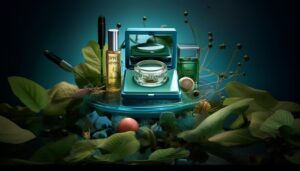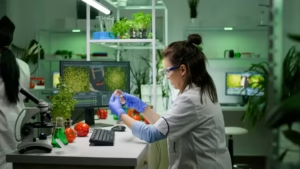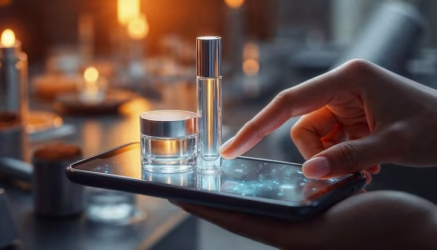AI in Cosmetic Formulation:
Imagine a world where your skincare is designed just for you—not for “oily” or “dry” skin, but for your DNA, lifestyle, and even the weather outside. Thanks to artificial intelligence (AI), this future is already here. Over 72% of beauty brands now use AI to create hyper-personalized products, slashing development time from 2 years to 6 months.
But how does it work? Can a computer really out-formulate a chemist? In this guide, we’ll break down the AI tools rewriting the rules of cosmetics, why they’re beating traditional methods, and how you can leverage them. Let’s geek out!
What Is AI in Cosmetic Formulation?
AI in cosmetics refers to machine learning algorithms that analyze vast datasets (skin types, ingredients, climate) to predict and create optimized formulas. Unlike traditional trial-and-error methods, AI can:
- Predict Outcomes: Forecast how ingredients interact before lab testing.
- Personalize at Scale: Tailor products to individual needs (e.g., acne-prone skin in humid climates).
- Reduce Waste: Cut failed experiments by up to 90% (Basetwo.ai, 2025).

AI vs. Human Chemists: A Quick Comparison
| Factor | Traditional Methods | AI-Driven Formulation |
|---|---|---|
| Development Time | 12–24 months | 3–6 months |
| Cost | 500k–2M per product | 50k–200k |
| Customization | Limited to broad categories | 1:1 personalization |
| Sustainability | 40% raw material waste | 5–10% waste (optimized recipes) |
How AI Works in Cosmetic Development
Step 1: Data Crunching
AI platforms pull from three core data streams:
Consumer Data:
Skin type, tone, allergies, age, and location are gathered via apps, quizzes, or wearables to assess personal needs.Ingredient Data:
Ingredient Data: Over 100,000 compounds—from hyaluronic acid to fermented mushrooms—are analyzed for benefits, stability, and skin compatibility. Understanding what’s inside your formula starts with decoding INCI names to ensure the ingredients align with product goals and compliance.Environmental Data:
Inputs like UV index, pollution levels, and humidity (sourced via IoT devices) help predict how a product will perform in real-world scenarios.
💡 Example: Proven Skincare’s AI analyzed 8 million reviews and 4,000 scientific papers to build truly personalized skincare routines.
Step 2: Pattern Recognition
AI identifies ingredient combinations and regional skincare needs that might go unnoticed by human formulators:
Unexpected Pairings:
Example: Niacinamide + Licorice Root extract increases skin-brightening efficacy by up to 30%—a combo flagged by AI through multi-source data mining.Regional Preferences:
People in Southeast Asia prefer lightweight, fungal-acne-safe textures—something AI systems can automatically recommend based on local climate and skin concerns.
AI also helps spot emerging ingredients like Greyverse, a novel peptide for reversing hair greying, which can be paired with boosters for age-defying haircare formulations.
Step 3: Virtual Testing
AI tests new products on digital skin avatars to simulate:
Irritation Risks:
Algorithms flag allergens or potential inflammatory reactions based on known sensitizers and skin types.Stability Over Time:
Predicts how pH, texture, and ingredient efficacy will hold under different temperatures and storage conditions.Performance Metrics:
Evaluates claims like “24-hour hydration” or “anti-aging in 2 weeks” before live human trials.
⚙️ Pro Tip: Basetwo.ai’s generative AI can generate 1,000+ formula variations in under 60 seconds, drastically speeding up iteration cycles.

Top 5 AI Tools Revolutionizing Cosmetics
1. Basetwo.ai
Key Feature:
Basetwo.ai uses advanced generative AI models to recommend optimal cosmetic formulations with enhanced stability, efficacy, and regulatory compliance.
Its platform simulates multiple formulation variables—like emulsifier compatibility, pH shifts, and preservative effectiveness—within seconds, reducing trial-and-error.
The AI continuously learns from formulation databases and lab feedback to generate better predictive models over time.
It’s especially valuable for brands launching clean beauty or multi-functional skincare products with tight go-to-market timelines.
2. Revieve’s Skin Analyzer
Key Feature:
Revieve’s Skin Analyzer combines AI, computer vision, and augmented reality to assess skin conditions like dryness, pores, fine lines, and hyperpigmentation via mobile selfies.
The platform adjusts for lighting, skin tone, and age, offering dermatologist-grade diagnostics for real-time skincare recommendations.
It integrates with e-commerce platforms, enabling brands to offer hyper-personalized routines to each customer.
Its AR interface provides a seamless, interactive customer journey that increases engagement and conversion rates.
3. INSIGHT by BTSA
Key Feature:
INSIGHT is an AI-powered system developed by BTSA to predict the oxidative stability of antioxidants within cosmetic emulsions and serums.
It uses deep learning trained on historical oxidation data across various ingredient environments—such as pH, temperature, and light exposure.
This predictive model allows chemists to simulate how antioxidants like vitamin E, ferulic acid, and vitamin C will degrade over time.
It dramatically reduces lab testing cycles while improving formulation robustness against spoilage.
4. Symrise’s Scentmate
Key Feature:
Scentmate by Symrise is an AI-powered fragrance development tool that uses consumer emotion mapping, seasonal data, and global scent preferences to generate unique perfume profiles.
The AI analyzes mood-related terms (e.g., calm, energize, romance) and recommends olfactory combinations that align with those feelings.
It also incorporates demographic trends, cultural scent profiles, and market gaps to design regionally relevant fragrances.
Perfumers can customize accords quickly, cutting ideation time from months to days.
5. Clinisept+ Skin Analytics
Key Feature:
Clinisept+ Skin Analytics uses IoT-enabled sensors embedded in skin scanners or wearable patches to monitor pH, hydration, and sebum levels in real time.
The AI collects continuous skin data and delivers customized product recommendations or alerts for mismatched skincare use.
These insights help consumers avoid irritation from products that are too acidic, too oily, or overly stripping.
It’s especially useful in clinics, salons, and premium skincare counters for live consultations.

4 Benefits of AI-Driven Cosmetic Formulation
1. Bespoke Beauty for All
Function of Beauty uses AI algorithms that analyze customer data—including scalp pH, hair porosity, oil levels, curl type, and history of chemical treatments—to deliver hyper-personalized shampoo and conditioner formulas.
The system uses a detailed online quiz and machine learning models to process over 12 billion possible combinations, ensuring that each customer receives a product that truly suits their unique hair biology.
This approach has significantly improved product efficacy and customer satisfaction, especially among those with textured or color-treated hair.
It represents a major leap toward inclusive beauty where personalization isn’t a luxury, but the new standard.
2. Speed to Market
L’Oréal’s Perso device combines AI-powered skin analysis, real-time environmental data, and 3D printing to dispense customized foundation, lip color, and skincare formulas on the spot.
In just 15 seconds, the device can blend pigments, coverage levels, and hydration needs—based on changes in climate, skin tone, or even hormonal fluctuations.
The AI continuously learns from app inputs and skin selfies, improving formula accuracy with every use.
This on-demand customization accelerates time-to-market and shifts production from factories to consumers’ vanities.
3. Sustainability Wins
Estée Lauder integrated AI across its product lifecycle—from ingredient sourcing to R&D and logistics—resulting in a 31% reduction in carbon emissions as of its 2024 Sustainability Report.
AI models help the brand minimize overproduction, reduce water usage, and replace petrochemical ingredients with bio-based alternatives, such as Emogreen L15—a 100% plant-derived, silicone-free emollient with a low environmental footprint.
Predictive analytics also help optimize packaging sizes based on consumer usage patterns, reducing material waste and transportation loads.
This AI-enhanced sustainability strategy supports Estée Lauder’s goal to reach net-zero emissions across direct operations by 2030.
4. Cost Efficiency
Atolla, now merged with Function of Beauty, utilizes AI to create custom serums tailored to an individual’s skin pH, oil level, hydration, and even environmental exposures—based on monthly skin testing.
Priced at just $40/month, it disrupts the traditional luxury skincare market where personalized formulations often exceed $200–$300 per product.
The AI ensures consistency across refills by adapting to users’ skin progress over time, reducing waste from trial-and-error purchases.
This model makes data-driven skincare accessible without compromising on quality or results—especially appealing to Gen Z and Millennials seeking value plus performance.
3 Challenges of AI in Cosmetics
1. Data Privacy Fears
In a 2025 NielsenIQ survey, 62% of consumers expressed concern that brands might misuse skin data collected through quizzes or apps without clear consent.
2. Over-Reliance on Tech
While AI excels in pattern recognition, it struggles to grasp cultural and emotional beauty trends like “glass skin” or “clean girl aesthetic”—areas where human insight remains irreplaceable.
3. Regulatory Gaps
The EU AI Act (2024) enforces transparency for AI-generated claims, but the U.S. still lacks a dedicated framework—raising concerns around safety, greenwashing, and consumer protection.
The Future of AI in Beauty
2025–2026:
Smart “skin GPS” wearables will track UV exposure, pollution levels, and hydration in real time to adapt product recommendations dynamically.By 2030:
AI-backed DNA analysis kits will let consumers generate custom skincare based on their genetics—bringing hyper-personalization to a molecular level.
FAQs: AI in Cosmetics
Q1: Is AI Formulation Safe for Sensitive Skin?
Yes. AI systems compare new formulas against 10,000+ global allergen databases to avoid triggers like fragrance allergens, parabens, or sulfates—making them ideal for sensitive or reactive skin types.
Q2: Can Small Brands Afford AI Tools?
Definitely. Affordable, cloud-based platforms like Kosmetic.AI start at $99/month, offering indie formulators access to data-driven insights once exclusive to big beauty conglomerates.
Q3: Will AI Replace Cosmetic Chemists?
No. AI handles data, prediction, and optimization—but human chemists bring sensory understanding, ethical judgment, and creativity that machines can’t replicate.
Key Takeaways
AI can reduce formulation costs and time by 60–80%, enabling faster innovation cycles.
Personalization via AI boosts customer retention and loyalty by up to 47% (McKinsey, 2025).
The future of beauty lies in collaboration—combining AI’s efficiency with human creativity and ethics for smarter, safer skincare.
